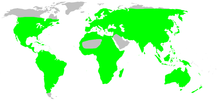Nursery web spider
| Nursery web spider | |
|---|---|

| |
| Nilus albocinctus, female Sabah, Borneo | |
| Scientific classification | |
| Domain: | Eukaryota |
| Kingdom: | Animalia |
| Phylum: | Arthropoda |
| Subphylum: | Chelicerata |
| Class: | Arachnida |
| Order: | Araneae |
| Infraorder: | Araneomorphae |
| Family: | Pisauridae Simon, 1890[1] |
| Genera | |
|
See text. | |
| Diversity[2] | |
| 47 genera, 355 species | |

| |
Nursery web spiders are spiders of the family Pisauridae. They resemble wolf spiders (family Lycosidae), but they carry their egg sacs by means of their jaws and pedipalps (instead of attaching them to their spinnerets). When the eggs are about to hatch, a mother spider will build a nursery "tent", put her egg sac inside and mount guard outside. The name nursery web spider is especially given to the European species Pisaura mirabilis, but the family also includes fishing spiders and raft spiders.
Unlike the wolf spiders, which have two very prominent eyes in addition to the other six, the eyes of the nursery web spiders are more or less the same size.[3] Many species are able to walk on the surface of still bodies of water, and may even dive beneath the surface for a time to escape enemies. In escaping predators, they may very well jump a distance of five or six inches. However, they do not find it easy to make their way up extremely smooth surfaces such as glass.
The female spider will sometimes attempt to eat the male after mating. The male, to reduce the risk of this, will often present the female with a gift such as a fly when approaching in the hope that this will satisfy her hunger. Sometimes this gift is a fake present intended to fool the female.[4] Males may wrap the fake gift in silk, to deceive the female to mate. Females can detect the fake gift and terminate mating, negating the male's deception in not giving a real gift.[5]
Taxonomy
Genera
As of March 2016[update], the World Spider Catalog accepted the following extant (living) genera:[1]
- Afropisaura Blandin, 1976
- Archipirata Simon, 1898
- Architis Simon, 1898
- Bradystichus Simon, 1884
- Caripetella Strand, 1928
- Charminus Thorell, 1899
- Chiasmopes Pavesi, 1883
- Cispinilus Roewer, 1955
- Cispius Simon, 1898
- Cladycnis Simon, 1898
- Conakrya Schmidt, 1956
- Dendrolycosa Doleschall, 1859
- Dolomedes Latreille, 1804
- Eucamptopus Pocock, 1900
- Euprosthenops Pocock, 1897
- Euprosthenopsis Blandin, 1974
- Hala Jocqué, 1994
- Hygropoda Thorell, 1894
- Ilipula Simon, 1903
- Inola Davies, 1982
- Maypacius Simon, 1898
- Megadolomedes Davies & Raven, 1980
- Nilus O. Pickard-Cambridge, 1876
- Papakula Strand, 1911
- Paracladycnis Blandin, 1979
- Perenethis L. Koch, 1878
- Phalaeops Roewer, 1955
- Pisaura Simon, 1885
- Pisaurina Simon, 1898
- Polyboea Thorell, 1895
- Qianlingula Zhang, Zhu & Song, 2004
- Ransonia Blandin, 1979
- Rothus Simon, 1898
- Sphedanus Thorell, 1877
- Stoliczka O. Pickard-Cambridge, 1885
- Tallonia Simon, 1889
- Tapinothele Simon, 1898
- Tapinothelella Strand, 1909
- Tapinothelops Roewer, 1955
- Tetragonophthalma Karsch, 1878
- Thalassiopsis Roewer, 1955
- Thaumasia Perty, 1833
- Tinus F. O. Pickard-Cambridge, 1901
- Tolma Jocqué, 1994
- Voraptipus Roewer, 1955
- Vuattouxia Blandin, 1979
- Walrencea Blandin, 1979
Some fossilized spiders have also been assigned to this family:[6]
- †Eopisaurella Petrunkevitch, 1958 (Early Eocene; Baltic amber)
- †Palaeoperenethis Seldon & Penney, 2009 (Ypresian, British Columbia, Canada)
-
Nursery web spider carrying egg sac
-
Dolomedes fimbriatus with its nursery of babies
-
Megadolomedes australianus with a dragonfly as prey
See also
References
- ^ a b "Family: Pisauridae Simon, 1890". World Spider Catalog. Natural History Museum Bern. Retrieved 2016-03-15.
- ^ "Currently valid spider genera and species", World Spider Catalog, Natural History Museum Bern, retrieved 2016-03-15
- ^ Sierwald, P. (1997) Phylogenetic analysis of Pisaurine nursery web spiders, with revisions of Tetragonophthalma and Perenethis (Araneae, Lycosidae, Pisauridae). The Journal of Arachnology 25:361-407 Americanarachnology.org
- ^ Male Spiders Scam Females with Gift-Wrapped Garbage
- ^ Albo, Maria J; Winther, Gudrun; Tuni, Cristina; Toft, Søren; Bilde, Trine (2011-11-14). "Worthless donations: male deception and female counter play in a nuptial gift-giving spider". BMC Evolutionary Biology. 11 (1). doi:10.1186/1471-2148-11-329. PMC 3228764. PMID 22082300.
{{cite journal}}: CS1 maint: unflagged free DOI (link) - ^ Dunlop, J.A.; Penney, D.; Jekel, D. (2015). "A summary list of fossil spiders and their relatives" (PDF). World Spider Catalog. Natural History Museum Bern. Retrieved 2016-03-15.



